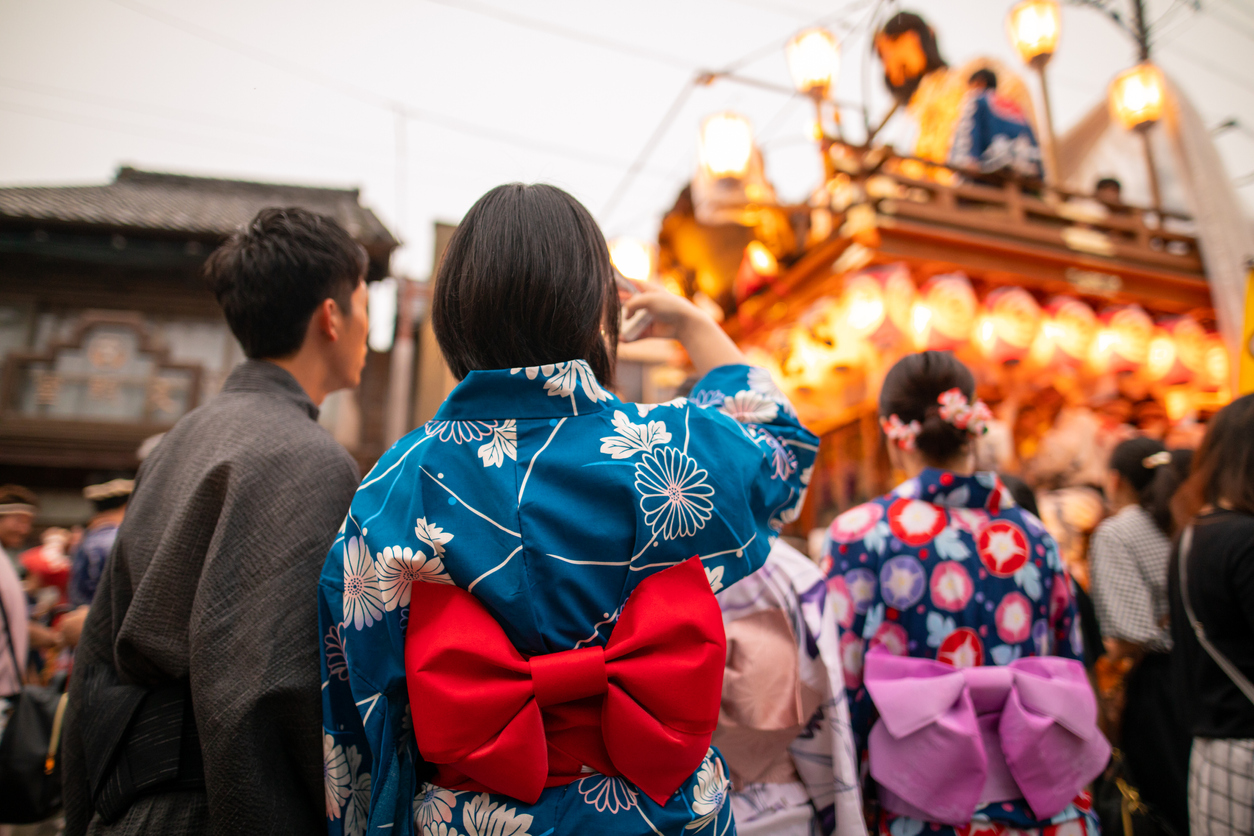Walking past the 1,800-year-old Sumiyoshi Jinja the other day, I noticed preparations underway for the Nagoshi Taisai (grand festival). Lanterns were being set up, and a chinowa, or large hoop made of straw, had been placed before the shrine’s main structure.
It was a relief to see a semblance of normalcy returning to life in Japan after more than a year of COVID-19 lockdowns and restrictions—normalcy that included the natsu matsuri, or the summer festivals, that were canceled last year. It just didn’t feel like summer without them.
Why summer?

In an ordinary year here in Fukuoka, there is a whole slew of natsu matsuri—from Hakata Gion Yamakasa in early July, Nagoshi and Tenjinsai in late July, the Mitama Matsuri in August to Hojoya in mid-September; not to mention a host of fireworks displays and outdoor music festivals. And, of course, there’s Obon.
There is also a generic natsu matsuri held at a small shrine in my neighborhood, another one at my boys’ elementary school. Hakata is by no means unique when it comes to the abundance of these festivals. It begs the question, then, of why there are so many in this hot and muggy season.
The reason for natsu matsuri has deep, superstitious roots divided into three overlapping aims: protecting the harvest, pacifying spirits and preventing or curing disease.
Protecting the harvest
Click here to read more.
- External Link
- https://gaijinpot.com/
 Take our user survey and make your voice heard.
Take our user survey and make your voice heard.















12 Comments
Login to comment
Hiroshi13
It seems Covid restrictions and this endless rain has cancelled summer for the foreseeable future.
Paustovsky
As a counterpoint, it is also notable how many Japanese dislike festivals. From mild irritation to outright contempt, the reasons are multitude.
Inconvenient due to roads being closed, noisy, overpriced 'food', corporate sponsors, Yakuza connections, groupthink mentality or just downright dasai.
Iron Lad
This is what japanese should keep.
Kobe White Bar Owner
A lack of creative thinking and a willingness to follow the crowd. Also not being able to just enjoy doing nothing and just chill keeps them on the go. A HUGE generalization but that’s my 2 pence.
kaimycahl
Personally I think its great. It allows Japan and certain regions to keep their cultural identities and traditions. It gives reason to look for the change in seasons. I see nothing wrong with it.
socrateos
The Japanese word for festival, "祭" (Matsuri), was written as "政" (Maturi-events) in ancient Japan. The latter means Politics. In other words, Festival and Politics meant the same thing in ancient Japan.
The First Festival can be found in the story of Japanese ancient mythology about Sun Goddess (Amaterasu) and Storm God (Susanoo).
The story tells us that Sun Goddess hid herself in a rock cave after her unruly brother, Storm God, disrupted her reign with his series of violence that resulted in a death of one of her workers. As a result, the world has become darkened and suffered famine and disease without sunlight. So an assembly of gods was called upon and all eight million gods gathered to discuss solutions to bring back Sun Goddess. And God of Wisdom (Omoikane) came up with a solution - a festival.
So they gathered in front of the rock-cave where Sun Goddess was hidden, singing and dancing with full of joy. When Goddess of Dancing (Amenouzume) , her clothing has become loosened and become almost naked while dancing. The crowd cheered and laughed so loud. Wondered what was happening outside of the cave, Sun Goddess decided to peek outside. When she move a rock that covered the cave moved a little bit, other gods did not miss the chance and moved the rock away to bring her out of the cave. The light was restored to the world and the world has become a happy land again. Japanese festivals are community efforts often accompanied with joyous singing and dancing to pray for its people.
Kobe White Bar Owner
@ socrates
when you say “ancient Japan” you mean Chinese Kanji, right?
JeffLee
The "ancient" Japanese didn't write anything: they were all illiterate in ancient times. Writing didn't start until around 700 AD.
socrateos
It was written in Chinese (政) but read in Japanese (まつりごと, or "matsuri-goto").